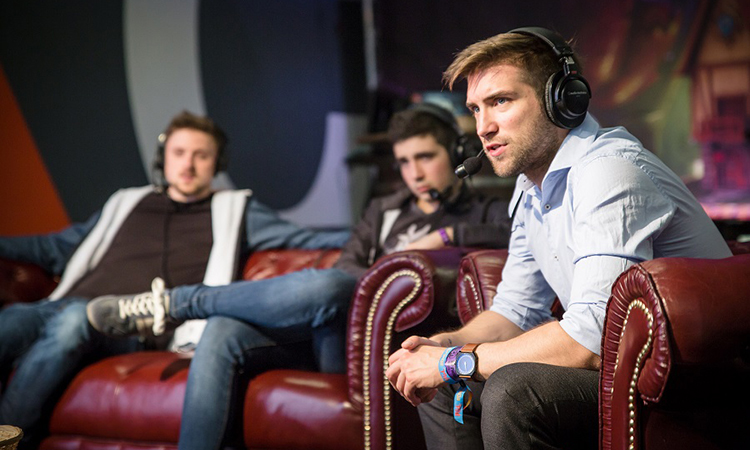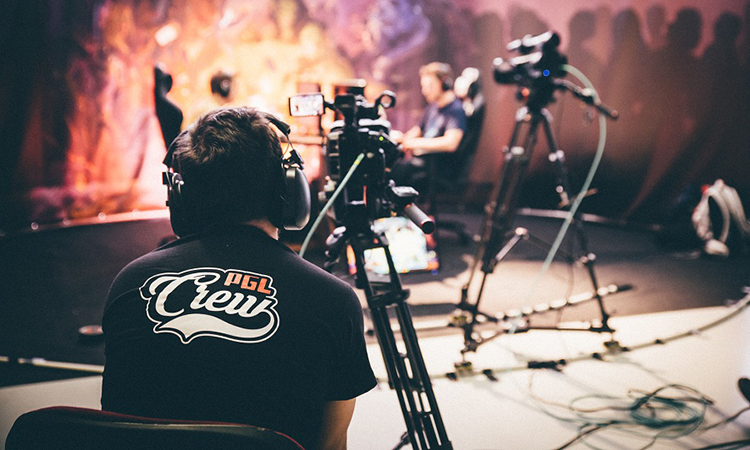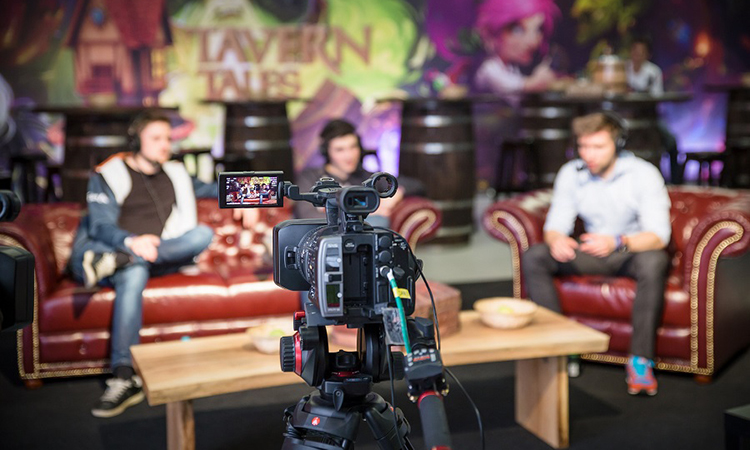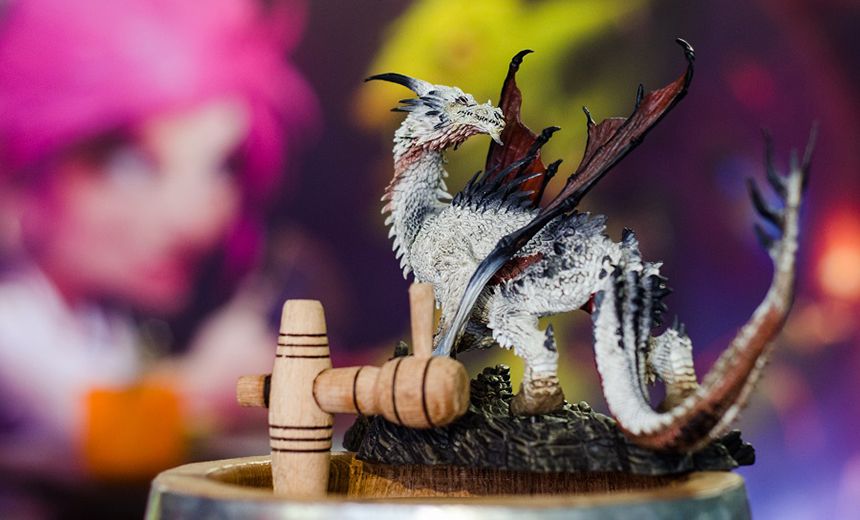
Tournament organizers are not an interview subject we see a lot of these days. With their schedules overflowing with work especially around upcoming events, it's difficult to catch them for a long chat. Not to mention that the people behind the scenes - despite having unique and deep knowledge of their esport - do not carry the allure which popular casters and players do.
Yes their voices ought to be heard every so often, as they provide a very different perspective into how the entire tournament climate is set up. A few days before Tavern Tales kicks off in Bucharest, I meet with PGL's Vlad Rosca, the person responsible for some of the biggest Hearthstone tournaments in Europe. My inquisitive nature and shared interest in the inner workings of the esports scene take us through a variety of topics, including why are not they partnering up with DreamHack this time around? Are they worried having too many unknown names might damage their tournament's viewership numbers? Is Hearthstone a "real" esport and if not - what's stopping it?
This is the first time since PGL is involved in Hearthstone that you’re not going to DreamHack. What made you decide to run independent for Tavern Tales Spring?
We felt it was a good opportunity for us to experiment and see how an event like this would go in our new studios. However, we won't be abandoning DreamHack just yet. You can expect a return the next time DreamHack is in Romania.
What would you say you lose and what do you gain for running solo this time?
The Spring Tavern Tales are an experiment for us on more than one account, and we felt it would be better if we do it in a more "private" environment. One could argue that we lose a bit on the exposure / media front, yet not being tied to a major event means that you don't run the risk of being eclipsed by another tournament with a considerably larger prize pool that's being hosted in the same building, even though the two communities might not overlap that much. So win some, lose some.
In previous Tavern Tales, you worked with Forsen so before we plunge into more serious questions, I want to ask: How is it working with him? I imagine it’s either the most fun thing in the world or living in perpetual fear that something will go terribly bad at some point.
Even though people can perceive him as being "goofy" to outright "ticking time bomb" when on his personal stream, he's very professional when it comes to casting and takes it very seriously. Now, your mileage may vary when it comes to the way he sometimes grills certain misplays or players, but one can argue that's part of his style.
I think the community loved him in the caster role overall, have to say it was a good pick for you guys. Many will ask why is he not casting Tavern Tales again, I’m sure.
That he was. We asked him, but he declined the invited. It's for him to reveal why he could not make it this time around, if he's so inclined.
"Hearthstone has its own identity that's very different from the more established esports titles and it shows."
You’ve been involved in other esports scenes beyond Hearthstone as well. What are the unique challenges that Hearthstone presents as compared to something like CS:GO? Is it easier to deal with a 1v1 game instead of accommodating teams of five and their managers?
Depends on how wide your definition of "easier" is. Sure, at face value Hearthstone does seem to be easier to handle, and it normally is, but overall a tournament organizer faces pretty much the same challenges. You still need a fair amount of PCs, if you want to accommodate a large number of players. You still want to have a stable Internet connection and ideally not run the gamble of using wi-fi just because the game can run on tablets or smartphone
Hearthstone being a 1v1 game, you have way more people to track than a team-based game. If one player is missing from the team, there's usually at least one or two colleagues or the manager who know where he's at or when he's coming back. If someone goes missing in a Hearthstone tournament between rounds and you don't have his phone number... #goodluck.
I will say though that Hearthstone tournaments are a lot more relaxed overall. Even though everyone wants to win, there's still this feeling of genuine friendship once a match ends.

F.l.t.r.: Forsen, Rdu and Lothar at PGL Tavern Tales Winter
There are still naysayers claiming Hearthstone can never be a “real” esport. From the point of an event organizer, what do you think? I mean, it certainly isn’t a game that will ever fill stadiums like Dota 2 or League.
I'm not entirely convinced that it actually needs to be a "real" esport. You can't force a cultural phenomenon, you can't make a game into a "real" esport overnight just because you make the casters wear a suit and a tie and be very serious in front of the camera.
More importantly, not every game is made to be viewed in a stadium. Hearthstone has its own identity that's very different from the more established titles in the esports arena and it shows. The community knows and (at least from what I have seen) loves this as well.
Can Hearthstone’s more, how should I put it, “quiet” nature hinder its growth as an esport in the future? A lot of what made the current leading esports successful is the combination of dynamic gameplay, clutch mechanical plays and out-of-game factors like team rivalries, for example. These are all things that Hearthstone lacks more or less, and it’s all about slow, thought-out strategies which, while deep and difficult, do not exactly move crowds.
True, it doesn't move crowds, but this can be balanced by other things... The player and caster personalities for one, the meteoric rises (and sometimes descents) of players, upsets that happen more often than not: These all tie-in very well together. It may not put your reflexes to the test, but Hearthstone overall is an experience. You can't just pluck away one element from it and go "yeah, mmm-hmm, this is what makes it great".
Thanks to this, I think there's still plenty of room for it to grow, because everyone will love a certain part of it. Some will watch just for the casters, some maybe for the drama to unfold as two former teammates go up against each other in the quarter-final, some will watch for the strategic insight.
"You can't make a game into a "real" esport overnight just because you make the casters wear a suit and a tie."
We’ve also seen teams leaving Hearthstone, stating that there’s no stability in the scene compared to league-based esports like Dota or League. Do you see this as a problem that needs to be remedied in the future to bring order and stability to the Hearthstone galaxy?
Stability is always an issue in any esport, but it can ultimately be seen as a growing pain through which all competitive titles go through at some point. For Hearthstone, this is compounded by the fact that it's a 1v1 game, so it's harder for a gaming house for instance to have the same effect when it comes to bringing a team together. One player can be brilliant and his other four colleagues "just" very good. The one brilliant player may not need to be social or particularly like the others: As long as he's doing his thing, he's golden.
My colleagues and I are on the opinion that Hearthstone’s player base and accessibility actually forces it to operate a more open competitive scene and there will always be some level of entropy, because you cannot really accommodate so many competitive players.
Indeed. The fact that you're a brilliant player may not necessarily mean you will always win. Sure, you might be somewhat consistent, but it's very difficult to stay at the top for very long. Some have managed to stay relevant more than others, but on the whole, Hearthstone can probably be considered way more unforgiving than other titles, especially with the rise of open qualifiers as opposed to the older "invite only" tournaments.

This ties nicely into my next question: Blizzard made several changes to HCT this year, one of which included the complete omitting of invites for HCT tournaments. This, of course, is tied with the risk of having no notable names for the main events which consequently could lead to lower viewership. If I was a tournament organizer who wants to run HCT events, I’d be pretty worried. Are you?
If you look at the participant list for the Spring TT, you'll notice that it's not really packed with notable names, and you can argue that this can be a downside. However, that's also the beauty of Hearthstone, because you never know when the next Firebat might show up. Everyone has to start from somewhere so it depends on what half of the glass you want to see.
Sure, from a pure exposure point of view, yes, having known players does attract more attention, I don't think anyone can argue with that, but at the same time mixing veterans with newcomers who are hungry to get their name out there, coupled with an interesting format and notable casters... It might not turn out so bad.
So you wouldn't say there's such a thing as "too much change" in terms of new-coming players?
If it rolls in naturally, no. However, as in all things, a balance must be maintained.
"Everyone has to start from somewhere. You never know when the next Firebat might show up."
What do you think of the idea of tournaments featuring a modified invite system? Like, you are allowed to reserve slots for players but only if they are top 5 on the HCT standings, for example, and you can only do half, or even a quarter. This way you reward consistency within the season and secure proven players and you don’t have to necessarily go for the popularity factor.
It's an option that we toyed with in the past and can be an interesting middle ground, but it ultimately boils down to what type of event the organizer wants to run. Some want people to know they hosted the biggest swiss group stage ever, some want to have just eight hand-picked players in a specific environment. If you want to have a more interesting format, like the recent Class Legends, it's probably better to go with established names who know the game very w.ell and can (potentially) make the most out of what you cooked up for that particular tournament.
I was more thinking along the lines of such invitationals being allowed by Blizzard to award HCT points instead of the current policy which is "if you have invites whatsoever, you get no points".
The problem here is that you need to have consistency, seeing as the HCT points are becoming more and more valuable. Some people still have a somewhat bitter taste from the old days when the same eight to 16 players were invited again and again and again in tournaments and it became sort of this old boys club.
Standard is about to become the official format for HCT events in the spring. While pros are eagerly waiting for its arrival, wouldn’t you prefer if you could also host wild tournaments and still be HCT eligible? Makes for a more diverse tournament climate, doesn’t it?
I think wild tournaments will still be valuable after the official introduction of standard, even without the HCT points. Granted, the points could offer it some additional prestige, but as I mentioned earlier, it depends on what the organizer is going after.
"Stability is always an issue in any esport, but it can ultimately be seen as a growing pain through which all competitive titles go through at some point."
Speaking of formats, a lot of organizers are trying to come up with cool stuff that’s never been done before. We’ve had ATLC, team sealed formats, Viagame’s pick-ban format, Challengestone, Lord of the Arena, you name it. Have you thought of going that route potentially, or do you prefer to stick to the proven, orthodox formats?
Now that our studios can accommodate Hearthstone events as well, it's a very real possibility that we might experiment even more down the line and see where it takes us. There are a lot of pitfalls when you're running with a format that nobody has tried before, but if you get it right...

Recently, organizes such as StarLadder partnered with other brands for the purpose of internationalizing their competition, bringing in Chinese players for example. Do you want to expand in that direction, or keeping it tight is your main goal for now?
We're always looking for ways to make our tournaments worth the trip even for players who are outside of Europe, so going forward we'll definitely look into what we can do to make them feel welcome and bring their strategies to the "old continent".
When you have to put a tournament together or plan for future events, which brands do you look up to for inspiration or as a measuring stick, a “We have to be at least that good” thought process of sorts?
We always look at what other tournament organizers are doing, regardless of the brand, because just like the next big player, you never know where a cool idea might pop-up. We try and keep an eye on everyone: Blizzard, DreamHack, StarLadder, ESL, SeatStory, even the more remote offerings like OGN or the i-League.
The wide public is largely blind to what happens behind the scenes of a tournament. Tell us the most trainwreck of a story in PGL events that you guys had to fix.
The trainwrecks have their special place in our “Almost epic fails” museum, but let's just say that in our early days of event hosting, we had to learn the hard way that running video cables near powerlines isn't the brightest idea if you actually want to receive something on the other end. Once we got that figured out, it made debugging a whole lot easier. *laughs*

